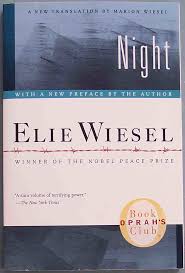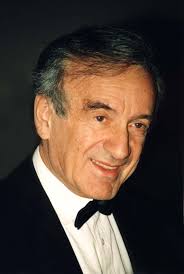Night Page #9
"Night" is a work by Elie Wiesel about his experience with his father in the Nazi German concentration camps at Auschwitz and Buchenwald in 1944–1945, at the height of the Holocaust toward the end of the Second World War. In just over 100 pages of sparse and fragmented narrative, Wiesel writes about the death of God and his own increasing disgust with humanity, reflected in the inversion of the parent–child relationship, as his father declines to a helpless state and Wiesel becomes his resentful teenage caregiver. "If only I could get rid of this dead weight ... Immediately I felt ashamed of myself, ashamed forever." In Night everything is inverted, every value destroyed. "Here there are no fathers, no brothers, no friends", a kapo tells him. "Everyone lives and dies for himself alone." Wiesel was 16 when Buchenwald was liberated by the United States Army in April 1945, too late for his father, who died after a beating while Wiesel lay silently
"EVERYBODY outside!" A dozen or so Gypsies had come to join our guard. The clubs and whips were cracking around me. My feet were running on their own. I tried to protect myself from the blows by hiding behind others. It was spring. The sun was shining. "Fall in, five by five!" The prisoners I had glimpsed that morning were working nearby. No guard in sight, only the chimney's s h a d o w ... L u l l e d by the sunshine and my dreams, I felt someone pulling at my sleeve. It was my father: "Come on, son." We marched. Gates opened and closed. We continued to march between the barbed wire. At every step, white signs with black skulls looked down on us. The inscription: WARNING! DAN- GER OF DEATH. What irony. Was there here a single place where one was not in danger of death? The Gypsies had stopped next to a barrack. They were replaced by SS men, who encircled us with machine guns and police dogs. The march had lasted half an hour. Looking around me, I noticed that the barbed wire was behind us. We had left the camp. It was a beautiful day in May. The fragrances of spring were in the air. The sun was setting. But no sooner had we taken a few more steps than we saw the barbed wire of another camp. This one had an iron gate with the overhead inscription: ARBEIT MACHT FREI. Work makes you free.Auschwitz. FIRST IMPRESSION: better than Birkenau. Cement buildings with two stories rather than wooden barracks. Little gardens here and there. We were led toward one of those "blocks." Seated on the ground by the entrance, we began to wait again. From time to time somebody was allowed to go in. These were the showers, a compulsory routine. Going from one camp to the other, several times a day, we had, each time, to go through them. After the hot shower, we stood shivering in the darkness. Our clothes had been left behind; we had been promised other clothes. Around midnight, we were told to run. "Faster!" yelled our guards. "The faster you run, the faster you'll get to go to sleep." After a few minutes of racing madly, we came to a new block. The man in charge was waiting. He was a young Pole, who was smiling at us. He began to talk to us and, despite our weariness, we listened attentively. "Comrades, you are now in the concentration camp Auschwitz. Ahead of you lies a long road paved with suffering. Don't lose hope. You have already eluded the worst danger: the selection. Therefore, muster your strength and keep your faith. We shall all see the day of liberation. Have faith in life, a thousand times faith. By driving out despair, you will move away from death. Hell does not last forever...And now, here is a prayer, or rather a piece of advice: let there be camaraderie among you. We are all brothers and share the same fate. The same smoke hovers over all our heads. Help each other. That is the only way to survive. And now, enough said, you are tired. Listen: you are in Block 17; I am responsible for keeping order here. Anyone with a complaint may come to see me. That is all. Go to sleep. Two people to a bunk. Good night." Those were the first human words. NO SOONER HAD WE CLIMBED into our bunks than we fell into a deep sleep. The next morning, the "veteran" inmates treated us without brutality. We went to wash. We were given new clothing. They brought us black coffee. We left the block around ten o'clock so it could be cleaned. Outside, the sun warmed us. Our morale was much improved. A good night's sleep had done its work. Friends met, exchanged a few sentences. We spoke of everything without ever mentioning those who had disappeared. The prevailing opinion was that the war was about to end. At about noon, we were brought some soup, one bowl of thick soup for each of us. I was terribly hungry, yet I refused to touch it. I was still the spoiled child of long ago. My father swallowed my ration.We then had a short nap in the shade of the block. That SS officer in the muddy barrack must have been lying: Auschwitz was, after all, a convalescent home... In the afternoon, they made us line up. Three prisoners brought a table and some medical instruments. We were told to roll up our left sleeves and file past the table. The three "veteran" prisoners, needles in hand, tattooed numbers on our left arms. I became A-7713. From then on, I had no other name. At dusk, a roll call. The work Kommandos had returned. The orchestra played military marches near the camp entrance. Tens of thousands of inmates stood in rows while the SS checked their numbers. After the roll call, the prisoners from all the blocks dispersed, looking for friends, relatives, or neighbors among the arrivals of the latest convoy. DAYS WENT BY. In the mornings: black coffee. At midday: soup. By the third day, I was eagerly eating any kind of s o u p ... A t six o'clock in the afternoon: roll call. Followed by bread with something. At nine o'clock: bedtime. We had already been in Auschwitz for eight days. It was after roll call. We stood waiting for the bell announcing its end. Suddenly I noticed someone passing between the rows. I heard him ask: "Who among you is Wiesel from Sighet?" The person looking for us was a small fellow with spectacles in a wizened face. My father answered: "That's me. Wiesel from Sighet." The fellow's eyes narrowed. He took a long look at my father. "You don't know m e ? ... Y o u don't recognize me. I'm your relative, Stein. Already forgotten? Stein. Stein from Antwerp. Reizel's husband. Your wife was Reizel's a u n t ... S h e often wrote to u s ... and such letters!" My father had not recognized him. He must have barely known him, always being up to his neck in communal affairs and not knowledgeable in family matters. He was always elsewhere, lost in thought. (Once, a cousin came to see us in Sighet. She had stayed at our house and eaten at our table for two weeks before my father noticed her presence for the first time.) No, he did not remember Stein. I recognized him right away. I had known Reizel, his wife, before she had left for Belgium. He told us that he had been deported in 1942. He said, "I heard people say that a transport had arrived from your region and I came to look for you. I thought you might have some news of Reizel and my two small boys who stayed in Antwerp..."
Translation
Translate and read this book in other languages:
Select another language:
- - Select -
- 简体中文 (Chinese - Simplified)
- 繁體中文 (Chinese - Traditional)
- Español (Spanish)
- Esperanto (Esperanto)
- 日本語 (Japanese)
- Português (Portuguese)
- Deutsch (German)
- العربية (Arabic)
- Français (French)
- Русский (Russian)
- ಕನ್ನಡ (Kannada)
- 한국어 (Korean)
- עברית (Hebrew)
- Gaeilge (Irish)
- Українська (Ukrainian)
- اردو (Urdu)
- Magyar (Hungarian)
- मानक हिन्दी (Hindi)
- Indonesia (Indonesian)
- Italiano (Italian)
- தமிழ் (Tamil)
- Türkçe (Turkish)
- తెలుగు (Telugu)
- ภาษาไทย (Thai)
- Tiếng Việt (Vietnamese)
- Čeština (Czech)
- Polski (Polish)
- Bahasa Indonesia (Indonesian)
- Românește (Romanian)
- Nederlands (Dutch)
- Ελληνικά (Greek)
- Latinum (Latin)
- Svenska (Swedish)
- Dansk (Danish)
- Suomi (Finnish)
- فارسی (Persian)
- ייִדיש (Yiddish)
- հայերեն (Armenian)
- Norsk (Norwegian)
- English (English)
Citation
Use the citation below to add this book to your bibliography:
Style:MLAChicagoAPA
"Night Books." Literature.com. STANDS4 LLC, 2024. Web. 23 Dec. 2024. <https://www.literature.com/book/night_336>.




Discuss this Night book with the community:
Report Comment
We're doing our best to make sure our content is useful, accurate and safe.
If by any chance you spot an inappropriate comment while navigating through our website please use this form to let us know, and we'll take care of it shortly.
Attachment
You need to be logged in to favorite.
Log In